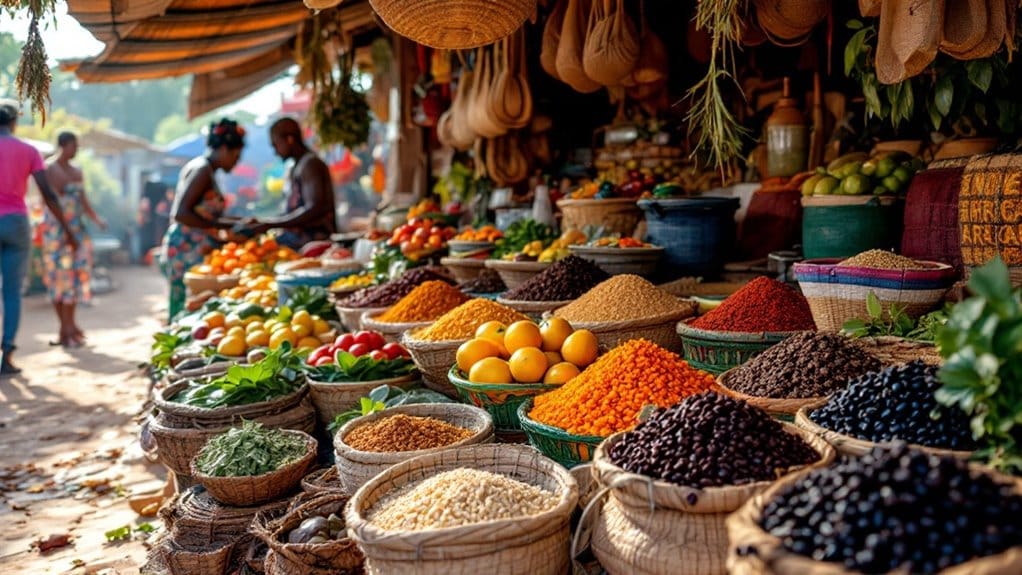To explore indigenous African ingredients, start by visiting local markets where you'll find unique produce like sorghum and marula fruit. Engaging with communities is key; attend workshops and connect with locals to learn about their culinary traditions and stories. Finally, experiment with traditional cooking techniques, such as slow-cooking stews or marinating proteins in local spices, to reveal rich flavors. Not only will you enhance your cooking skills, but you'll also honor the cultural significance behind these ingredients. There's much more to discover about these flavors and techniques that can elevate your culinary experience.
Key Takeaways
- Visit local markets to discover unique indigenous ingredients and support local farmers through fair trade practices.
- Engage with community workshops to learn about traditional cooking techniques and the cultural significance of various ingredients.
- Experiment with cooking methods like steaming and slow-cooking to preserve the nutritional value and enhance flavors of indigenous foods.
- Collaborate with local chefs to gain insights into authentic recipes and preparation methods that honor culinary heritage.
- Celebrate diversity by incorporating indigenous ingredients into your meals, fostering a deeper appreciation for African culinary traditions.
Research Local Ingredients
When you plunge into the vibrant world of indigenous African ingredients, local markets become your treasure trove. Here, you'll find a stunning array of fresh produce that's often overlooked in mainstream supermarkets.
Take the time to explore these markets; not only will you discover unique flavors, but you'll also learn about their nutritional benefits. Ingredients like sorghum and millet boast high fiber content, aiding digestion and promoting overall health.
As you explore deeper, consider the cultural significance of these ingredients, such as cowpeas and marula fruit, which are tied to the culinary traditions of various African communities.
By incorporating these indigenous ingredients into your cooking, you're not just preparing a meal; you're honoring a rich heritage.
To guarantee that you're sourcing these ingredients sustainably, look into fair trade options and support local farmers.
Joining community organizations or connecting with local chefs who specialize in African cuisine can provide invaluable insights into traditional dishes and preparation methods.
Embrace this journey, and you'll not only enhance your culinary repertoire but also foster a deeper connection to the culture and people behind these incredible ingredients.
Engage With Communities
How can you truly appreciate the richness of indigenous African ingredients? Engaging with local communities is key. By participating in community workshops, you'll learn traditional harvesting practices and the cultural significance of indigenous foods. This not only enhances your culinary skills but also supports local artisans and farmers.
Connecting with community members opens doors to unique stories about their culinary heritage and the local ingredients they cherish. Here's a glimpse of what you can discover:
| Experience | Impact | Connection |
|---|---|---|
| Community Workshops | Hands-on experience with ingredients | Build relationships with locals |
| Indigenous Markets | Unique ingredients & stories | Empower local farmers |
| Collaborations with Chefs | Share recipes & techniques | Celebrate culinary diversity |
Collaborating with farmers promotes sustainable sourcing and fair trade practices, empowering communities economically. As you explore these connections, you'll find that the journey to understand African dishes becomes a heartfelt experience, fostering a sense of belonging in a vibrant tapestry of flavors and traditions. Embrace these opportunities, and you'll deepen your appreciation for the diverse ingredients that shape African cuisine.
Experiment With Cooking Techniques
Experimenting with cooking techniques opens up a world of flavor and nutrition in indigenous African cuisine. By exploring methods like steaming and boiling, you can preserve the nutritional value of local ingredients such as millet and sorghum, which are packed with fiber and vitamins.
Marinating proteins in indigenous spices like ginger and garlic not only enhances flavor but also boosts health benefits, making your dishes more nutritious and delicious.
Consider traditional preservation techniques like drying or fermenting to extend the shelf life and flavor of ingredients such as marula fruit and cowpeas. These methods showcase the diverse array of indigenous foods available to you.
You might also want to try slow-cooking stews with indigenous meats and vegetables, allowing rich flavors and textures to develop, similar to dishes like tagine or Jollof rice.
And don't forget the cultural significance of communal cooking; preparing large meals for family gatherings not only nurtures the food but also fosters community bonding.
Frequently Asked Questions
What Are the Indigenous Ingredients of Africa?
When you explore Africa's indigenous ingredients, you'll discover a rich tapestry of flavors and nutrients.
Think of indigenous grains like sorghum and millet, wild fruits such as baobab, and traditional vegetables that connect you to the land.
You'll encounter herbal medicine, ancient seasonings, foraged mushrooms, and native nuts, each carrying cultural significance.
These ingredients not only nourish your body but also invite you to belong to a vibrant, diverse heritage.
What Are the Traditional Cooking Techniques in Africa?
When you immerse yourself in traditional African cooking techniques, you'll discover a delightful dance of diversity.
Grilling methods over open fire create smoky flavors, while steaming techniques preserve nutrients.
Fermentation processes, like making injera, offer unique tastes.
Don't forget stone grinding for spices and clay pot cooking for rich, slow-cooked dishes.
Enjoy the warmth of slow cooking, where flavors meld beautifully.
Embrace these methods, and you'll feel a sense of belonging to this vibrant culinary heritage.
Which of These Ingredients Are Commonly Used in African Recipes?
You'll find ingredients like moringa, baobab, and millet commonly used in African recipes, each offering unique flavors and health benefits.
Exploring local markets lets you discover seasonal produce that embodies cultural significance. Sourcing these ingredients can vary by region, leading to delightful variations in cooking methods.
Embrace the versatility of cowpeas and pumpkin, often featured in stews and salads, bringing a taste of tradition right to your kitchen.
Enjoy the journey!
What Spices Do Africans Use?
When you explore what spices Africans use, you'll discover a vibrant array like African spice blends and regional spice variations.
Cooking with spices such as ginger, garlic, and grains of paradise brings rich flavor profiles and health benefits.
As you immerse yourself in culinary history exploration, consider the cultural significance of these ingredients.
Spice sourcing tips can help you find authentic flavors, enhancing your dishes while connecting you to a shared heritage in the kitchen.
Conclusion
In exploring indigenous African ingredients, remember that "you can't know where you're going until you know where you've been." By researching local ingredients, engaging with communities, and experimenting with cooking techniques, you'll not only enrich your culinary experience but also honor the cultures behind these flavors. Each dish tells a story, and your journey into these ingredients will deepen your appreciation for Africa's rich culinary heritage. So, get out there and start cooking!









